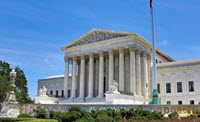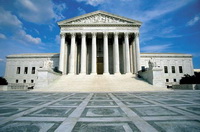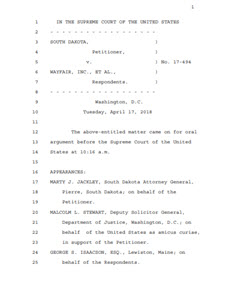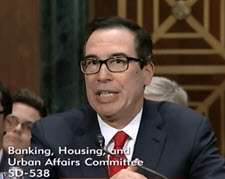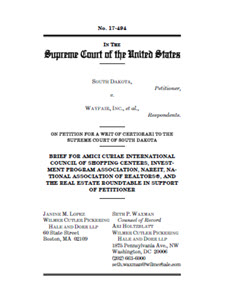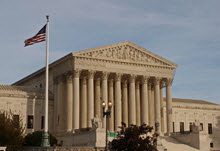The Supreme Court’s recent South Dakota v. Wayfair decision allowing States to collect tax owed on remote internet sales purchases could generate an estimated $250 million in annual revenue for the state of Virginia, which is aiming to start its online sales tax program this summer.
 |
|
The Real Estate Roundtable and seven other national trade organizations wrote to congressional leaders on Sept. 17, 2018 opposing any legislation that reverses or limits the Supreme Court’s June 22 decision in South Dakota v. Wayfair, which allows States to collect tax owed on remote internet sales purchases. |
- Many states are seeking to expand their tax authority over online sales in the wake of the Supreme Court’s June 21 South Dakota v. Wayfair decision. The 5-4 Wayfair ruling strongly suggests that South Dakota’s law requiring remote sellers to collect sales tax on more than $100,000 of in-state sales or 200 transactions complies with constitutional law.
- Virginia Finance Secretary Aubrey L. Layne Jr. recently told Bloomberg Tax that a state bill in next year’s Virginia legislative session would align with principles supported in the high court’s Wayfair decision. Layne said details of the bill may be unveiled in December and added, “My guess is it probably won’t be effective until July.” (BNA, Oct. 30)
- Despite the Wayfair ruling, a bipartisan quartet of House members led by Rep. Jim Sensenbrenner (R-WI) introduced legislation on Sept. 13 that would prohibit states from requiring remote sellers with less than $10 million in national annual sales from collecting and remitting sales and use taxes – pending a compact approved by Congress. In addition to Sensenbrenner’s Online Sales Simplicity and Small Business Relief Act of 2018 (H.R. 6824), other bills in Congress would go even further in reversing the Wayfair decision. (Tax Notes, Nov. 7)
- Opponents of the decision are asking Congress to include restrictions on States in an end-of-year bill. (Bloomberg, Oct. 24). However, legislation to roll back Wayfair is unlikely. Any major legislation must be negotiated by leaders of both parties, who have limited time during a Lame Duck session. Congressional negotiators are expected instead to focus on a handful of “must pass” bills.
- The Real Estate Roundtable and seven other national trade organizations wrote to congressional leaders on Sept. 17 opposing legislation that reverses or limits Wayfair. (Wayfair Comment Letter, Sept. 17)
The business coalition letter explains that for more than a decade, industry groups “have undertaken significant efforts to establish economic parity between online and brick-and-mortar sellers that would better reflect the changing dynamics of today’s omnichannel marketplace. For Congress to insert themselves post-ruling only creates additional uncertainty and further complicates the implementation process, while undermining the level playing field created by the Wayfair decision.” (Roundtable Weekly, Sept. 21)
The eight organizations conclude the letter by offering to work with Congress on any problems that may arise from state implementation of remote internet sales tax collection allowed by Wayfair. (Roundtable Weekly, June 22)
